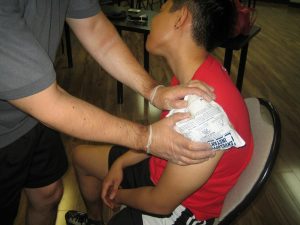Information on Human and Animal Bites
If you’ve been bitten by an animal or another human being it is important to know that bites can become infected if not treated properly. If the bite breaks skin it is imperative that you seek medical attention immediately. The bacteria found in the mouths of humans and animals can lead towards infection if not looked at soon after the incident, and can cause harmful infections if not treated. Such infections can seep into the bloodstream and cause serious illness if not treated in a timely manner. Thankfully such infections as rabies and tetanus are very rare in the UK, but it is still recommended to seek treatment if you’ve been bitten.
Procedures to follow after being bitten

There are several tips and guidelines to follow depending on what type of bite you’ve sustained, but the most basic actions to take are:
1) Do your best to cleanse the wound while holding it under warm running water for several minutes. Even if it hasn’t broken the skin it is wise to disinfect the affected area.
2) Remove any foreign material from the site of the wound, such as dirt, hair, or any other materials that might increase the chance for an infection.
3) If you are bleeding, place a sterile bandage or compress over it and apply pressure to stop the bleeding. Once it is dry, cover it with a new, sterile bandage.
4) Consult a doctor if the wound is more serious than a minor flesh wound, and take painkillers as prescribed.
Signs that a bite might be infected
*Painful swelling and redness around the site of the wound
*Milky, pus-like fluid seeps from the wound
*The development of fever in excess of 100 degrees Fahrenheit
*The swelling of glands around the chin, groin, or armpits
*Vivid red streaks that radiate from the site of the wound
What to do to avoid animal bites
Animals don’t normally try to bite humans. Typically if they bite they are provoked in some manner. The result is always a serious matter though and must be avoided if at all possible. While many animal bites can be serious, the majority reported are by pets, namely dogs. Here are a few ways to avoid such a result.
1) Avoid leaving young children alone with dogs, regardless if they are pets. Dogs can be temperamental animals, and can become scared quite easily by what they don’t understand. A friendly gesture by a child can be taken the wrong way and cause disaster.
2) It is unwise to treat a dog with neglect or anything but respect. Adults and children are at risk if they abuse a dog, as it may very well bite in defense or out of fear.
3) Don’t simply pet a strange dog. Ask their owner if it is okay, and even then allow the dog to sniff your hand first to get a feel for you.
